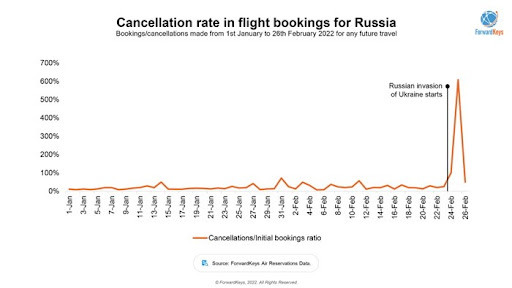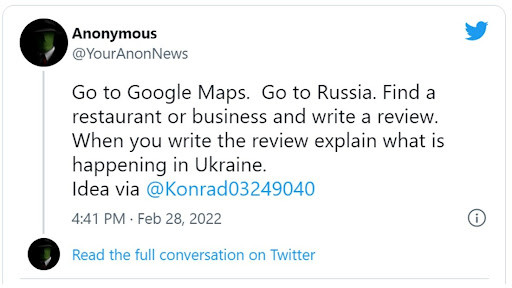2022. The year when everything was going to get better, right? The imminent and very real apocalyptic threat of global warming aside, things (as that band once sang) can only get better.
Then Putin finally pushed the button on military action and it dawned on an already battered and bruised world that the roaring twenties really are starting to look like the decade we’d all rather forget.
Russia’s invasion of Ukraine will inevitably in one way or another have an effect on all our lives, not just emotionally but financially, as the economic ripple effects of the conflict are already starting to be felt across the globe. The cost of oil, for instance, has now surpassed $110 a barrel (with one analyst estimating that oil prices could soon hit $130 a barrel).
In terms of travel, all areas of travel have responded promptly. 33 countries have so far closed their skies to Russian aircrafts with Russia reciprocating in kind. Airbus and Boeing have withdrawn support from Russia’s Aviation industry. Cruise operators such as Norwegian Cruise Line Holdings, TUI Cruises, Viking and Carnival Corporation have all rerouted their itineraries to avoid popular ports such as St Petersburg. Expedia has ceased sales to and from Russia.
On 25th February, the day after the start of the invasion, ForwardKeys data shows that for every one booking made for travel to Russia there were six cancellations of pre-existing bookings. The invasion also triggered a collapse in the market for Russian outbound travel, with the suspension of travel by national authorities and airlines a key factor.

The World Tourism Organisation (UNWTO) has convened an emergency session of its Executive Council to respond to members’ requests for Russia’s suspension. The session will be in Madrid on 8th March and the motion is likely to be passed.
Travel is of course, on the whole, a luxury, and the impact on the industry pales into insignificance when you see the devastation and destruction unfolding in front of our very eyes. However, while our thoughts are first and foremost with those caught up in the conflict, the events will come as yet another blow to an industry still on its knees following the pandemic. Countries close to the region are understandably fearful, many of whom are heavily reliant on tourism from Russia. Turkey for instance is one of these nations, with 4.7 million Russian visitors to its shores in 2021.

The impact on travel bookings in the UK
The full impact on the sector outside of the region is yet to be felt. The past couple of months have seen a spike in bookings with many travel and tourism companies reporting their highest number of sales since 2019 and the outlook for Summer 2022 is generally very positive.
Speaking to a travel advisor friend of mine yesterday who deals primarily with leisure travel, I was keen to understand whether she had seen any changes in booking activity off the back of the conflict.
Turns out she hadn’t seen a difference, and these past couple of weeks have been as busy as ever, not a single cancellation due to the conflict.
‘Nearly everyone I speak to refuses to put their lives on hold any longer’ she explained.
‘Nearly everyone’…but not quite. Spare a thought for instance for the couple in Hull who requested a refund from a comedy club in Blackpool because the events in Russia and Ukraine means ‘it is not safe to travel from Hull’. Not surprisingly their request was declined…the M62 presumably not under imminent threat from attack at present.
The industry will nonetheless have to deal with some effects in the months to come. The oil price rises will inevitably lead to a higher cost of flights, as will re-routings of west-east flight paths. ‘Passenger flights forced to reroute could add between £3,000 and £9,000 per hour in costs, depending on the size of the plane and the price of fuel’ Henane Becker, an airline analyst for Cowen reported.
Helping those in need
Along with many other industries, those in the travel sector have played a critical role in offering support to those fleeing the conflict. Rail services across Europe are offering free travel and Greece’s Tourism minister Vassilis Kikilias announced plans last week to open 50,000 jobs in tourism to Ukrainian refugees. Airbnb, after suspending all operations in Russia and Belarus, is offering free temporary accommodation for up to 100,000 Ukrainian refugees.
Tripadvisor has advised they have also halted commerce with all Russian-state or oligarch-owned businesses, however a campaign to flood restaurants and hotels in Russia with fake reviews was swiftly halted by removing the ability to leave new reviews for Russian establishments. One such review read ‘The Food was great! Unfortunately, Putin spoiled our appetites by invading Ukraine’.
The idea gained traction after a tweet posted by international hacking organisation Anonymous was retweeted nearly 25k times.

Another Twitter-led campaign has seen members of the public paying for Airbnb rooms in Ukraine with the express aim of putting money directly into the pockets of the war-stricken hosts. Airbnb has also agreed to waive fees in the country, proving that it is actually possible to put humanity before profit (you listening Coca Cola, McDonalds et al?)
At the time of writing, the war shows no signs of easing. Every news update brings further reports of devastation, the Ukrainian people weakened but resilient while their cities crumble. A video posted a few days ago showed a woman sat at a piano outside Lviv station playing a heart-breakingly beautiful rendition of What A Wonderful World, surrounded by exhausted refugees fleeing from the east of the country. Moments like that will live long in the memory.
And when this is over (please God, let that be soon), we’ll remember those people, countries and companies that stepped up.
At present it would seem that the travel sector, to varying degrees, is playing its part.
To show our support for the Ukrainian people, we have made a donation to DEC Ukraine Humanitarian Appeal.





